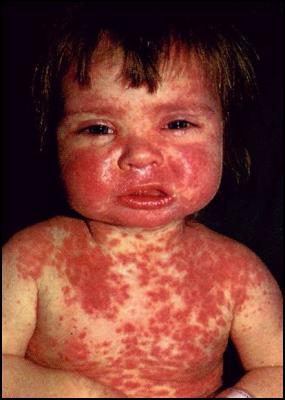Northlanders urged to get vaccinated against measles
Northlanders urged to get vaccinated against measles

Dr Clair Mills, Medical Officer of Health at Northland DHB, advises Northlanders to ensure their families are protected from measles. 238 cases have been reported this year so far from the Auckland region, Waikato, Bay of Plenty, Lakes, Hawkes Bay, Taranaki and Wellington, with over 100 cases from the recent outbreak in a high school in Hamilton.
“A person with confirmed measles in Hawkes Bay was recently visited by people living in Northland, and it is probably only a matter of time before measles spreads north, especially with school holidays approaching” said Dr Mills.
Measles is spread by tiny droplets in the air and is very infectious, easily spreading to those nearby. The first symptoms (fever, cough, runny nose and red eyes) can be mistaken for a cold, with the rash (appearing on the face and neck and spreading over the body) three to five days later.
“Measles can be a very serious illness, with one in three sufferers experiencing complications such as ear infections, pneumonia, bronchitis or diarrhoea,” said Dr Mills.
“While one in 10 on average requires hospitalisation, admission rates in the Hamilton outbreak have been higher.”
She reiterated that immunisation is the best protection from this potentially serious disease.
“This is an avoidable disease where there is an effective vaccine. Immunisation protects not only the individual, but also stops the spread of this disease within our communities.”
“Please double-check that your child is not at risk. There is a window of opportunity now while no cases have yet been reported in Northland to catch up on any missed vaccinations.
Vaccination is a much better option than having a very sick child at home for a couple of weeks.”
Unimmunised people who have had contact with a person with measles, will normally be advised to stay at home and away from all public places, school or work for 14 days after their contact.
“Anyone born before 1969 or who has received two doses of MMR can reasonably assume they are already immune.”
Dr Mills says anyone displaying symptoms of measles, which include fever, cough, runny nose, sore red eyes, followed by a rash spreading from the head and neck over the body, should immediately telephone their doctor or Healthline on 0800 611 116 for advice.
Ends


 Tātaki Auckland Unlimited: Discover The Treasures Of Tāmaki Makaurau - Making Māori Tourism Accessible To All
Tātaki Auckland Unlimited: Discover The Treasures Of Tāmaki Makaurau - Making Māori Tourism Accessible To All International Writers' Workshop NZ Inc: Ōtepoti Poets Top The Kathleen Grattan Prize For A Sequence Of Poems
International Writers' Workshop NZ Inc: Ōtepoti Poets Top The Kathleen Grattan Prize For A Sequence Of Poems NZ Amateur Sport Association: 22 Amendments Proposed For 2022 Act Lodged On 22 November
NZ Amateur Sport Association: 22 Amendments Proposed For 2022 Act Lodged On 22 November Auckland University of Technology: Reading Helps Children Face A Difficult Future
Auckland University of Technology: Reading Helps Children Face A Difficult Future PATHA: Puberty Blocker Evidence Brief Affirms Aotearoa’s Approach
PATHA: Puberty Blocker Evidence Brief Affirms Aotearoa’s Approach Tataki Auckland Unlimited: Into Ocean & Ice - Unveiling Antarctica's Past And Present
Tataki Auckland Unlimited: Into Ocean & Ice - Unveiling Antarctica's Past And Present